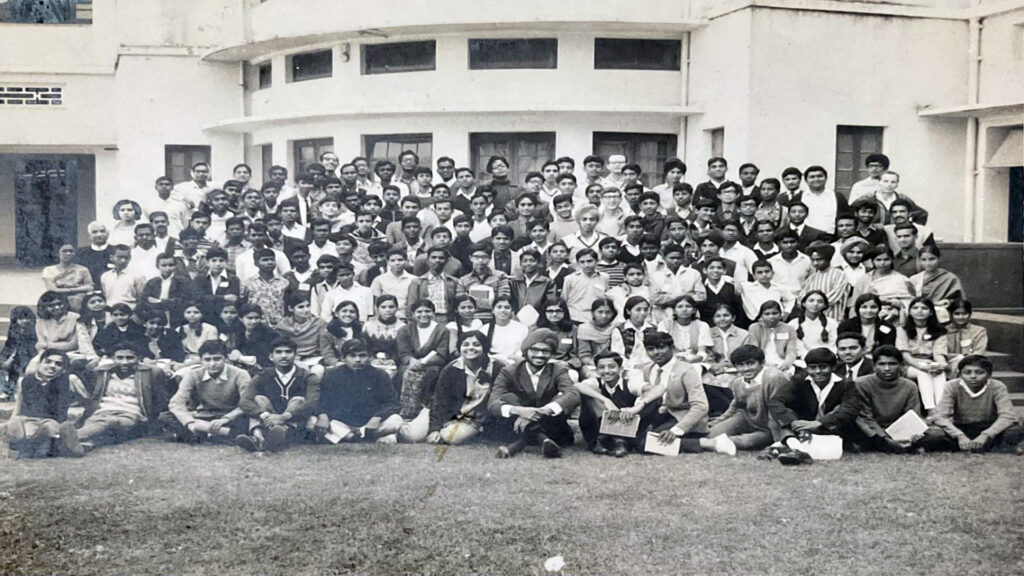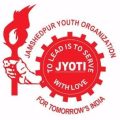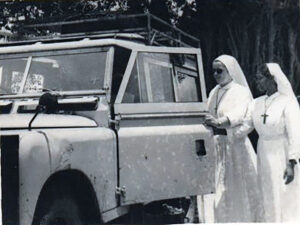
THE ORIGIN OF JYOTI
How Schol. Freddie Conceived the Idea of JYOTI
 Many great movements had a small beginning. Likewise, the origin of JYOTI links to the spark of inspiration received in the classroom of Loyola School. In December 1970, Schol. Freddie Rodrigues, SJ was doing Regency in Loyola School, Jamshedpur, along with Schol. Emile Coelho, SJ. One day, while taking a Moral Science Class in Loyola School, Schol. Freddie conceived the idea of holding a high profile Youth Camp for all the school students of Jamshedpur. Schol. Freddie communicated his ideas to Fr. Frank McGauley, the Rector and Principal of Loyola School.
Many great movements had a small beginning. Likewise, the origin of JYOTI links to the spark of inspiration received in the classroom of Loyola School. In December 1970, Schol. Freddie Rodrigues, SJ was doing Regency in Loyola School, Jamshedpur, along with Schol. Emile Coelho, SJ. One day, while taking a Moral Science Class in Loyola School, Schol. Freddie conceived the idea of holding a high profile Youth Camp for all the school students of Jamshedpur. Schol. Freddie communicated his ideas to Fr. Frank McGauley, the Rector and Principal of Loyola School.
The First Youth Camp, 14-19 December, 1970

Whatever Freddie did was always a high profile one. He was a crowd puller. Father McGauley S.J, the then Rector of Loyola School, who was also the Principal, got jittery about the proposal Youth Camp because it would involve the good name of the Jesuits of Jamshedpur. Schol. Freddie mobilized the school students of Jamshedpur; basically the English and Hindi and Bengalee medium Schools. Seeing the possibility of a youth camp of such a great magnitude and fearing that it was a big risk, Father McGauley called upon Father Joseph Currie, S.J who, at that time, was the Director of St.Joseph’s Welfare Centre, Golmuri, to take over the reins of the proposed Youth Camp, scheduled to take place from 14 to 19 December, 1970. Fr.McGauley communicated about this proposed Youth Camp and asked Fr.Joseph Currie to shoulder the responsibility. Eventually, he nurtured the feeble idea to blossom and grow into a movement to reckon with during his six years of tenure from 1970 to 1976 as the first Coordinator of JYOTI.
Logo Description

- Torch : Torch signifie light ‘jyoti’ in Hindi
- Wheel : Wheel signifies motion or progress, a journey
- Motto : To Lead is to Serve with Love
The Beginning of JYOTI
-
Genesis of JYOTI
Started in mid-December, 1970
-
First Youth Camp
Mid-December 1970 at Loyola School, Jamshedpur
-
Naming of JYOTI
Mid-December 1970
-
Relief Material Drive
Relief material drive for refugees in March, 1971
-
First Refugee Service
Refugee service at Bangladesh border during Indo-Pak War-1971
The morning assemblies were used in different schools to spread information about the proposed Youth Camp. Father Currie took over the charge of the Youth Camp. Schol. Freddie was a man of feelings and was led by the Spirit of God in and through his feelings; when he felt something needed to be done, he went ahead and did it, regardless of the consequences. He was a man for the poor too and had the experience of mobilizing the whole of Chaibasa town for the espousal of social justice causes.
The Founding Jesuits of JYOTI
The First Youth Camp (FYC) was held in Loyola Hall. The fees for the camp was only Rs. 35.00 per head for the five-days camp which was residential for the boys. Their staying arrangements were made in Loyola Hostel. There were boys from Loyola School, R. D. Tata School, Mrs. K.M.P.M. School and Little Flower School who stayed all five days in the hostel. Schol. Basil Horo was in-charge of the School Hostel and was also the Prefect for the hostel during the camp. The Youth Camp was a smashing success. It was the work of the Spirit of God; a work that made Schol. Freddie rejoice, with joy exceedingly great.
The Managing Committee consisting of Fr. Currie, Schols.Rodrigues and Coelho and some Counsellors from Loyola School, Sacred Heart Convent School and Little Flower School was formed with Fr. Currie being the unanimous choice for taking over as the Moderator of this nascent Youth Movement. The centre of JYOTI activities were directed to St. Joseph’s Welfare Centre, Golmuri, as it was centrally located and was easily accessible to all and Fr. Currie resided there. The Head Office of JYOTI got located in the SJWC which became the centre of all JYOTI activities.
The First Group's Refugee Service

Now it was the time to march towards the refugee camps. By the month of March or April, 1971, JYOTI wholeheartedly responded to the first call for humanitarian service—to go and work for the refugees pouring in across the borders of East Pakistan and India. The destination was Kishanganj. A team was constituted, comprising of Fr. Currie, Schol.Rodrigues, Schol.Coelho, Mr.C. S. Venkat; and the students included Vivian Almedia from Loyola along with some other Loyola students. Care was taken to make sure that the items reached the real needy people. Some volunteers and some counsellors were sent along with the collected items.
Arrangements were made for their transportation and necessary permissions were obtained for the inter-States movement of the truck. Schol. Emile Coelho and Fr. Joseph Currie led the team of 40 school students and took food, medicine, clothes and other necessary items and headed for the then West Dinajpur District, with Bhalurghat as its headquarters. They spent about a week and distributed the items. On their return they narrated heart-breaking stories of despair, torture, killings, etc. that were told to them by the hungry and starving people.
This is a brief history of the initial years of JYOTI that has grown by leaps and bound over 50 years till date. The heroic activities of JYOTI speaks about the rich and adventurous work JYOTI has carried out for the sake of humanity.
